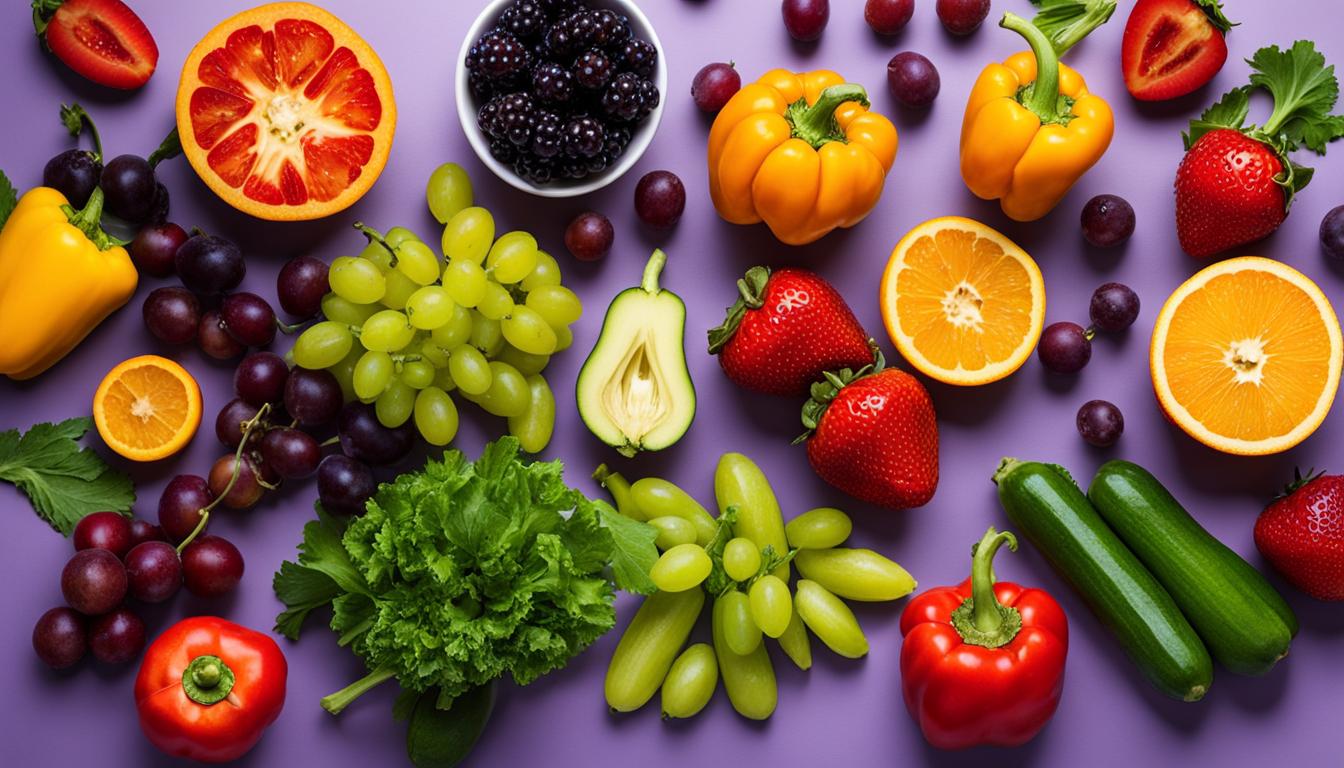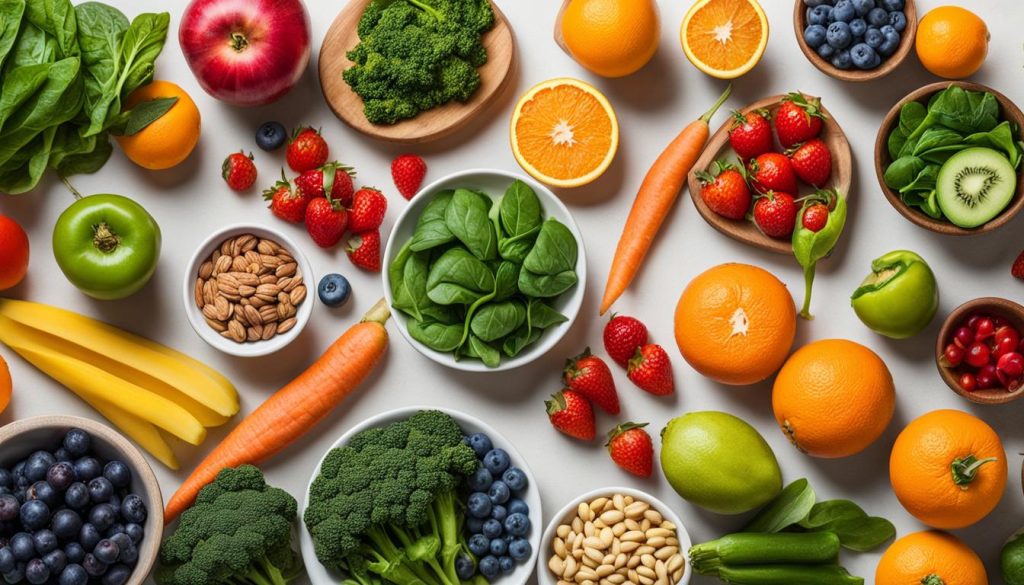All About the Vision Diet. A Simple Guide!

Welcome to my comprehensive guide on the Vision Diet, a powerful approach to improving your eye health and enhancing your vision naturally. In this article, I will provide you with valuable information on nutrition for eyes, including eye-healthy foods, essential vitamins for eyes, eye care supplements, and effective tips for maintaining healthy eyes. Whether you want to prevent vision issues or optimize your visual acuity, the Vision Diet is the key to achieving your goals.
Key Takeaways:
- The Vision Diet focuses on incorporating specific nutrients into your diet to boost eye health and improve vision.
- Eye-healthy foods rich in vitamins and antioxidants play a crucial role in maintaining healthy eyes.
- Key nutrients for eye health include vitamin A, vitamin C, vitamin E, omega-3 fatty acids, lutein, zeaxanthin, and zinc.
- While a well-balanced diet is usually sufficient, supplements may be recommended for individuals with certain eye conditions.
- Consulting with an ophthalmologist is essential before starting any supplements or making significant dietary changes.
The Role of Nutrition in Eye Health
https://www.youtube.com/watch?v=0YNotclndsk
Proper nutrition plays a crucial role in maintaining the health of our eyes. Just like other parts of our body, our eyes require specific nutrients to function optimally and to reduce the risk of eye diseases. A healthy diet that is low in fat and rich in fruits, vegetables, and whole grains can not only benefit our heart but also support the health of our eyes.
One of the key nutrients for eye health is vitamin A. It is essential for the proper functioning of the retina and can help prevent dry eyes. Foods rich in vitamin A include carrots, sweet potatoes, cantaloupes, and apricots. Another important nutrient is vitamin C, which acts as an antioxidant and helps protect our eyes from damage caused by free radicals. Citrus fruits, peaches, red bell peppers, tomatoes, and strawberries are excellent sources of vitamin C.
Vitamin E is also crucial for promoting eye health. It is an antioxidant that supports cell health and can be found in avocados, almonds, and sunflower seeds. Omega-3 fatty acids are another important nutrient for our eyes, as they support tear function and may reduce the risk of eye diseases. Cold-water fish like salmon and tuna are rich sources of omega-3 fatty acids. Additionally, lutein and zeaxanthin, found in leafy green vegetables, protect the macula and promote clear vision. Foods rich in zinc, such as beans, oysters, lean red meat, and poultry, contribute to retinal health.
The Importance of a Healthy Diet for Arteries and Eye Health
A healthy diet not only benefits our arteries but also our eyes. The same nutrients that promote cardiovascular health, such as vitamin C and omega-3 fatty acids, also support the health of our eyes. By maintaining a balanced diet and incorporating eye-healthy foods into our meals, we can nourish our eyes and reduce the risk of eye diseases.
The Key Nutrients for Eye Health

When it comes to maintaining healthy eyes, certain key nutrients play a crucial role. These nutrients provide the necessary support for optimal vision and help reduce the risk of eye diseases. Let's take a closer look at some of the essential vitamins and minerals your eyes need:
Vitamin A:
Vitamin A is essential for the proper functioning of the retina and helps prevent dry eyes. Good sources of vitamin A include carrots, sweet potatoes, cantaloupe, and apricots.
Vitamin C:
Vitamin C acts as a powerful antioxidant, protecting the eyes from damage caused by free radicals. Citrus fruits, peaches, red bell peppers, tomatoes, and strawberries are all excellent sources of vitamin C.
Vitamin E:
Vitamin E is another important antioxidant that promotes overall cell health. Avocados, almonds, and sunflower seeds are rich sources of vitamin E.
Omega-3 Fatty Acids:
Omega-3 fatty acids are known to support tear function and may help reduce the risk of eye diseases. Cold-water fish like salmon and tuna are excellent sources of omega-3 fatty acids.
Lutein and Zeaxanthin:
These powerful antioxidants protect the macula, the central part of the retina, and promote clear vision. Leafy green vegetables such as spinach, kale, and collard greens are rich in lutein and zeaxanthin.
Zinc:
Zinc contributes to retinal health and can be found in foods like beans, oysters, lean red meat, and poultry.
The consumption of these key nutrients through a balanced diet is crucial for the maintenance of healthy eyes. Including a variety of foods rich in vitamin A, vitamin C, vitamin E, omega-3 fatty acids, lutein, zeaxanthin, and zinc can help support your vision and overall eye health.
The Role of Supplements in Eye Health

While maintaining a well-balanced diet is crucial for optimal eye health, there are instances where supplements can play a beneficial role. For individuals with macular degeneration (AMD), in particular, supplements are often recommended to slow down the progression of the disease. The Age-Related Eye Disease Study (AREDS) has identified specific supplements that can support retinal health in individuals with AMD.
Supplements can provide essential eye-healthy nutrients for individuals who may have difficulty obtaining them solely from dietary intake.
It's important to consult with an ophthalmologist or healthcare professional before starting any supplement regimen. They can guide you on the appropriate dosage and specific nutrients that may be beneficial for your eye health. It's worth noting that some individuals may require higher doses of certain nutrients due to medical reasons or individual health conditions.
However, it is generally recommended to obtain eye-healthy nutrients through a well-rounded diet rather than solely relying on supplements. A diet rich in fruits, vegetables, whole grains, lean proteins, and healthy fats can provide a wide array of essential vitamins and minerals for overall eye health. Supplements should be seen as a complementary approach to a healthy diet, rather than a substitute.
The Role of AREDS Supplements
The AREDS supplements, which typically include a combination of vitamins C and E, zinc, copper, and antioxidants, have been specifically formulated to support individuals with AMD. These supplements are designed to slow down the progression of the disease and reduce the risk of vision loss. However, it's important to note that these supplements are not intended to cure or reverse AMD.
Individuals considering AREDS supplements should consult their healthcare professional for personalized recommendations based on their specific condition. The dosage and composition of these supplements may vary depending on the severity of AMD and individual health factors. Regular eye check-ups and ongoing communication with your healthcare provider are essential to monitor the effectiveness of the supplements and make any necessary adjustments to your treatment plan.
Remember, while supplements can be beneficial in certain cases, they should always be approached in conjunction with a balanced diet and a healthy lifestyle. Prioritizing a nutrient-rich diet can provide your eyes with the necessary vitamins, minerals, and antioxidants to maintain optimal eye health. By fostering a holistic approach to eye care with a focus on both dietary intake and targeted supplementation, you can support your eyes' well-being and promote long-term vision health.
Conclusion
The Vision Diet is a powerful tool for promoting and preserving eye health. By incorporating a variety of nutrient-rich foods into your daily meals, you can optimize your vision and reduce the risk of eye diseases. Foods high in vitamins A, C, and E, omega-3 fatty acids, lutein, zeaxanthin, and zinc can provide your eyes with the support they need to stay healthy and vibrant.
While supplements may be recommended for certain medical conditions, it is generally advisable to obtain these eye-healthy nutrients through a balanced diet. By focusing on nutrition, you can nourish your eyes from within and experience the benefits of optimal vision for years to come.
Remember, the health of your eyes is closely linked to your overall well-being. By adopting the Vision Diet, you are not only taking care of your eyes but also investing in your long-term health. So, start making conscious choices in your diet today and enjoy a lifetime of healthy eyes and optimal vision!
FAQ
What is the Vision Diet?
The Vision Diet is a dietary approach that focuses on incorporating specific nutrients into your daily meals to support and maintain eye health.
Can the Vision Diet improve my vision?
While the Vision Diet cannot guarantee improved vision, it can help optimize your visual health by providing the necessary nutrients that support the eyes.
What are some eye-healthy foods that I can include in my diet?
Eye-healthy foods include carrots, sweet potatoes, cantaloupe, apricots, citrus fruits, peaches, red bell peppers, tomatoes, strawberries, avocados, almonds, sunflower seeds, leafy green vegetables, beans, oysters, lean red meat, and poultry.
Are supplements necessary for eye health?
In most cases, a well-balanced diet can provide the necessary eye-healthy nutrients. However, supplements may be recommended for individuals with specific medical conditions, such as macular degeneration. It is best to consult an ophthalmologist before taking any supplements.
What is the Age-Related Eye Disease Study (AREDS)?
The Age-Related Eye Disease Study (AREDS) is a study that recommends specific supplements for individuals with age-related macular degeneration (AMD) to slow down disease progression.
How can I maintain healthy eyes throughout my life?
Maintaining a balanced diet, incorporating eye-healthy foods, getting regular eye check-ups, and protecting your eyes from harmful UV rays are essential for maintaining healthy eyes throughout your life.